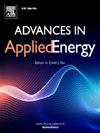AI-empowered online control optimization for enhanced efficiency and robustness of building central cooling systems
IF 13.8
Q1 ENERGY & FUELS
引用次数: 0
Abstract
Adopting Artificial Intelligence for optimizing building system controls has gained significant attention due to the growing emphasis on building energy efficiency. However, substantial gaps remain between academic research and the practical implementation of AI-based algorithms. Key factors hindering implementation include computational efficiency requirements and concerns about reliability in online applications. This paper addresses these challenges by presenting AI-empowered online control optimization technologies designed for practical implementation. A simplified deep learning-enabled Genetic Algorithm is developed to accelerate optimization processes, ensuring optimization intervals are short enough for online applications. This algorithm also significantly reduces CPU and memory usage, enabling deployment on miniaturized control station for field implementation. To enhance stability and reliability, a robust assurance scheme is introduced, which switches to expert knowledge-based control under abnormal conditions. Hardware-in-the-loop tests validate the proposed strategy's computation efficiency, control performance and operational robustness using a physical smart station controlling a simulated real-time dynamic cooling system. Test results show that the optimal control strategy achieves 7.66 % energy savings and exhibits strong operational robustness.
人工智能支持的在线控制优化,提高了建筑中央冷却系统的效率和稳健性
由于对建筑节能的日益重视,采用人工智能来优化建筑系统控制得到了极大的关注。然而,学术研究和基于人工智能的算法的实际实施之间仍然存在巨大差距。阻碍实现的关键因素包括计算效率要求和对在线应用程序可靠性的关注。本文通过介绍为实际实施而设计的人工智能在线控制优化技术来解决这些挑战。开发了一种简化的深度学习遗传算法来加速优化过程,确保在线应用的优化间隔足够短。该算法还显著降低了CPU和内存的使用,使其能够部署在小型化的控制站上进行现场实施。为了提高稳定性和可靠性,引入了一个强大的保证方案,在异常情况下切换到基于专家知识的控制。硬件在环测试通过物理智能站控制模拟实时动态冷却系统验证了所提策略的计算效率、控制性能和操作鲁棒性。试验结果表明,最优控制策略节能7.66%,具有较强的鲁棒性。
本文章由计算机程序翻译,如有差异,请以英文原文为准。
求助全文
约1分钟内获得全文
求助全文

 求助内容:
求助内容: 应助结果提醒方式:
应助结果提醒方式:


